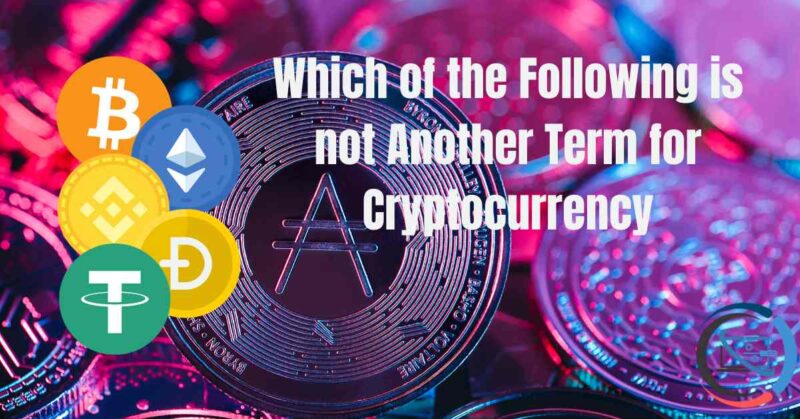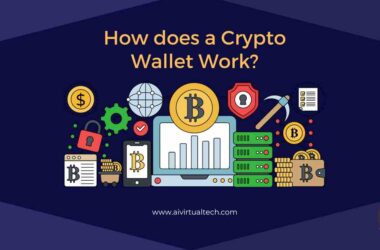Which of the following is not another term for cryptocurrency? Delve into this insightful and comprehensive article to unravel the diverse and ever-evolving terminology synonymous with cryptocurrency. Gain a deep understanding of the intricacies and nuances that set different cryptocurrencies apart from one another. Explore the fascinating world of digital currencies and discover the unique features and characteristics that make each of them distinct and noteworthy.
Understanding Cryptocurrency
- Cryptocurrency is a revolutionary digital asset designed to work as a medium of exchange. They operate on decentralized platforms. Bitcoin, introduced in 2009, was the first decentralized cryptocurrency.
- Cryptocurrencies make use of distributed ledger technology, primarily blockchain, to gain decentralization, transparency, and immutability. This digital money uses cryptography to secure and verify transactions.
- Investors and technologists frequently use a variety of terms when discussing cryptocurrencies, such as digital currency, altcoins, and virtual currency. While these terms are often used interchangeably, it is worth noting that they have distinct meanings and implications.
- Digital currency refers to any form of currency that exists solely in digital or electronic form, while altcoins are alternative cryptocurrencies that have been developed as alternatives to Bitcoin.
- On the other hand, virtual currency is a broader term that encompasses any type of currency that is not issued or regulated by a central authority, including both digital and physical forms.
- By understanding the nuances of these terms, one can gain a deeper appreciation for the diverse landscape of the cryptocurrency ecosystem.
Digital Currency
Digital currency, in its broadest sense, encompasses all forms of money that exist in digital form, revolutionizing the way we think about financial transactions.
It comprises not only virtual currency and electronic money but also the groundbreaking concept of cryptocurrency, which operates on decentralized networks using cryptographic protocols.
This innovative approach to currency has the potential to reshape our global economic landscape, offering increased security, efficiency, and accessibility to individuals and businesses worldwide.
Electronic money, also known as digital currency, is a form of payment that differs from cryptocurrencies in several key aspects. Unlike cryptocurrencies, electronic money is regulated and governed by a central authority, such as a bank or a financial institution.
This regulatory framework provides a level of oversight and control that ensures the stability and security of electronic money transactions.
On the other hand, cryptocurrencies operate in a decentralized manner, without the need for a central authority. This enables greater anonymity and independence but also introduces challenges in terms of regulation and trust.
Virtual currencies are a type of digital currency, used in specific communities such as online gaming sites and social networks. Cryptocurrency is a subset of virtual currency that uses cryptography.
Altcoins
- Altcoins are another term for cryptocurrencies other than Bitcoin. They emerged after the success of Bitcoin as alternatives (“alt” for alternative). Most altcoins are variants of Bitcoin and use similar underlying protocols.
- Despite their similarities, each altcoin operates on its unique framework and offers different functionalities that cater to specific use cases. Ethereum, with its smart contract capabilities, has become a popular choice for decentralized applications and programmable money.
- Ripple, on the other hand, focuses on enabling fast and low-cost international money transfers through its blockchain-based payment protocol.
- Litecoin, known for its faster block generation time and efficient transaction confirmation, aims to be a digital currency suitable for everyday transactions.
- These examples illustrate the diverse landscape of altcoins, showcasing their distinct features and potential applications in the ever-evolving cryptocurrency ecosystem.
- However, not all digital coins or tokens that companies issue as a means of transaction are cryptocurrencies. In addition to cryptocurrencies, different types of tokens serve various purposes.
Tokens and Coins
While most people use the terms token and coin interchangeably, they represent different concepts. Coins like Bitcoin and Ethereum have their blockchain, whereas tokens operate on an existing blockchain.
Tokens typically represent an asset or specific use case and exist as a layer on top of another blockchain.
They can be created and managed using smart contracts, which enable the development of decentralized applications and various functionalities.
In contrast, cryptocurrencies, which can be both coins and tokens, serve as a medium of exchange and store of value within their respective blockchain networks.
Tokens serve various purposes in the digital world. They can be used to represent ownership in a company, providing stakeholders with a tangible stake in its success.
Moreover, tokens can grant access rights to a network, allowing users to participate in decentralized applications and contribute to their development. It’s important to note that while some tokens are cryptocurrencies, not all tokens fall into this category.
Virtual Currencies
- Virtual currencies, also known as cryptocurrencies, are digital forms of money that exist solely in certain online communities.
- These currencies operate independently from traditional banking systems and are decentralized, meaning they are not regulated by any central authority.
- They are typically created and managed using advanced cryptographic techniques, ensuring secure and transparent transactions. With their rising popularity, virtual currencies have sparked a new wave of innovation and financial possibilities in the digital world.
- Virtual currencies are different from cryptocurrencies because they exist in a central database that can be administrated or changed by the currency’s creators. Cryptocurrencies, however, operate on a decentralized platform.
- While all cryptocurrencies are considered virtual currencies, it’s important to note that the reverse is not always true.
- While cryptocurrencies are a type of virtual currency, not all virtual currencies are necessarily cryptocurrencies. This distinction highlights the fact that the term “virtual currency” encompasses a broader range of digital currencies beyond just cryptocurrencies.
Fiat Digital Currency
Fiat Digital Currencies are digital forms of fiat money. These currencies are issued by the state and their value is not determined by supply and demand factors in the market. The key difference here lies in the term “fiat,” which refers to a currency that a government has declared to be legal tender.
On the other hand, cryptocurrencies are not legal tender and are not backed by a government. Unlike Fiat Digital Currencies, the value of cryptocurrencies is often determined by the principles of supply and demand in the market.
Cryptocurrencies operate on decentralized networks and use cryptographic technology to secure transactions.
Fiat Digital Currencies and cryptocurrencies differ primarily in their issuance and value determination.
While Fiat Digital Currencies are issued by the state and their value is not influenced by market dynamics, cryptocurrencies are not legal tender and their value is determined by market forces.
Summary
This article provides comprehensive coverage of the topic of digital currencies. It starts by discussing altcoins, which are cryptocurrencies other than Bitcoin and often offer unique functionalities. The piece then shifts focus to tokens and coins, highlighting the difference between the two. While coins have their blockchain, tokens operate on an existing one. The narrative then dives into the realm of virtual currencies, which are digital forms of money operating independently from traditional banking systems. Not all virtual currencies are cryptocurrencies, a key distinction made clear in the article. Lastly, the discussion on Fiat Digital Currencies draws our attention to the digital forms of fiat money, showing the contrast between them and cryptocurrencies.
Questions and Answers
What are Altcoins?
Altcoins are cryptocurrencies other than Bitcoin. They emerged after the success of Bitcoin and offer different functionalities catering to specific use cases.
What is the difference between a coin and a token?
A coin, like Bitcoin or Ethereum, has its blockchain, whereas a token operates on an existing blockchain. Tokens typically represent an asset or specific use case.
What is a virtual currency?
Virtual currencies are digital forms of money that operate independently from traditional banking systems. They are typically created and managed using cryptographic techniques.
Are all virtual currencies cryptocurrencies?
No, while all cryptocurrencies are considered virtual currencies, not all virtual currencies are necessarily cryptocurrencies.
How do Fiat Digital Currencies differ from cryptocurrencies?
Fiat Digital Currencies are digital forms of fiat money issued by the state and their value is not influenced by market dynamics. In contrast, cryptocurrencies are not legal tender and their value is determined by market forces.
Conclusion
In conclusion, the digital currency landscape is vast and diverse, with various types each serving unique purposes in the financial ecosystem. Understanding the differences among Altcoins, tokens, virtual currencies, and Fiat Digital Currencies is vital for anyone interested in the digital economy. As these digital assets continue to evolve, they are creating new opportunities and challenges in the world of finance.













